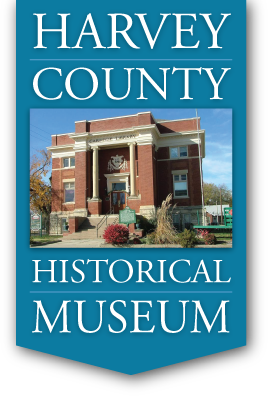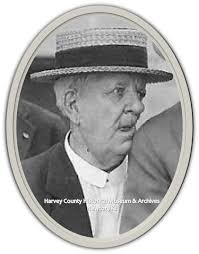Our thanks to HCHM volunteer, Damon Penner, for contributing a guest post. Damon is a senior at Wichita State University, and has volunteered at the museum for the past 3 years. He has also volunteered at the Cosmosphere in Hutchinson
John C. Johnston: Harvey County Founding Father
By Damon Penner, HCHM volunteer
Handwriting and Coffee Stained Paperwork
Soldier, teacher, homesteader, and church founder are just a few words that would
describe Mr. John C. Johnston. Johnston, responsible for collecting the Civil War pension
paperwork in the Harvey County Historical Museum’s collection, was a man who made an
impact on the town that became Newton, KS as well as his neighbors. Through archival research,
I have been able to piece together a short biography of the man, whose handwriting and coffee
stained paperwork I have had the honor to assist in preserving for future generations.
Generations which Mr. Johnston never got the opportunity to physically meet.
Swept up in the Wartime Enthusiasm
Johnston, was not a native of Kansas, but an immigrant from the state of Pennsylvania.
Born in Greenville, Pennsylvania (in Indian County) in 1846, Johnston, like many of his fellow
Pennsylvanians, was swept up in the wartime enthusiasm and passions the were brought about
with the American Civil War’s beginning in 1861. Enlisting at a local recruitment office,
Johnston, aged 15, was made a member of Company A of the 61 st Pennsylvania Volunteer
Infantry Regiment (which holds the distinction of losing the most officers of any US Army
regiment during the Civil War). Serving in the famed Army of the Potomac and in many of the
battles in which the army fought such as the Seven Days Battles, Antietam, Fredericksburg,
Chancellorsville (Fredericksburg sector), Gettysburg, and the bloody battles of 1864, Johnston
saw three year’s action, receiving a facial wound from an artillery shell at the Battle of
Spotsylvania Courthouse (the wound left him disfigured and afraid to show the left side of his
face for the rest of his life).
Civilian Life
Returning to civilian life however, proved to be boring. Cold feet eventually brought him to Kansas. Accepting a teaching position in the Greenville, Pennsylvania area and marrying a local woman, Johnston lived the life of a teacher for five years. Seeing that Johnston was bored with teaching, his brothers, William and James, and a cousin convinced him that they should head west to Kansas and establish homesteads, which they had been granted because of their status as Civil War veterans. Reaching Sedgwick County, the four travelers would hire a guide to take them to the Highland township in modern day Harvey County. Against their wishes, however, the land that the guide had taken them to (and they had subsequently claimed) was in Marion County. Although their claims were the only claims in the area, Johnston and his fellow veterans sought to create an entirely new county that would encompass their claims.
A New County
Made possible by some politicking with Wichita and Sedgwick County officials, Harvey
County was established in February 1872. Constituting the Alta, Emma, Garden, Burrton,
Darlington, Halstead, Lake, Lakin, Macon, Newton, Pleasant, Richland, and Sedgwick
townships. Seeing that, although he had made his wish for a new county possible, Johnston had
to conduct a formal annexation of the Walton and Highland townships to the county in 1873.
Needing a county seat for this new county, the cattle town of Newton was chosen as the new seat
for the county. Contrary to popular belief, Johnston and the other founders of Harvey County
chose to name the county not after the founder of the famous Harvey Houses, but rather the
governor of Kansas at the time of the county’s establishment, James M. Harvey.
Serving the Community
Becoming a resident of the recently selected county seat, Johnston, his wife, children, and
the men that traveled to Kansas with him, would leave an impact on their brainchild. One of his
friends would serve as one of the first representatives in the state legislature for Sedgwick
County (although he lived in Harvey County). Another, along with Johnston would serve as
Harvey County’s representatives, while two more would serve as the representatives for Marion
County. Seeking to not only have an impact on the politics of Harvey County, but the religiosity
of the county seat’s populace. Establishing the First Presbyterian Church in Newton, Johnston
would see to it that Newtonians would be able to worship together.
Between all of the activities brought about by his public service, Johnston would help local Civil War veterans and their families to receive the money owed them by the government for their services in the Civil War. Although he was influential in the making of modern Newton, it is this humble act of assisting his former comrades in arms in Harvey County that is the act that I am the most grateful for.
Bibliography
- Johnston, John C. “Early Days in Kansas” The Newton Journal (Newton, KS), February 29,
1924.* - Johnston, John C. “Reminiscence of Early Kansas Days” The Newton Journal (Newton, KS) July
15, 1921.* - Hawks, Steve A. “61 st Pennsylvania Volunteer Infantry Regiment” The Civil War in the East,
2020, accessed on June 28, 2020 https://civilwarintheeast.com/us-regiments-
batteries/pennsylvania/61st-pennsylvania-infantry/. - *Note: Both articles are available for viewing through the Harvey County Historical Museum.
Civil War Inventory at HCHM
Additional Stories from the Johnston Civil War Pension Collection
Minor Child of George Beard, alias George Winter: Civil War Pensions

